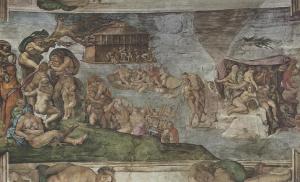
Do Dogs Go To Heaven?
Last week I received a very serious and very sad theological question from a former student. His family had just said goodbye to Amos, their 13 year-old Great Dane. What does our Christian faith have to say about such loss, Cody wondered? He said that his reading and reflecting
leads me in some way to believe that animals have souls, and that their salvation is linked to us becoming conduits of grace upon their existence. If this is the case, then Amos was/is indeed “saved,” because he was/is deeply loved. But what does that mean for his soul? Is Amos in heaven? Is his ghost with us still, though in a new dimension (similar to your reflection from the Cappadocian Fathers)? Erika and I have found ourselves praying “God have mercy on Amos’ soul,” and if lex orandi, lex credendi [the way we pray guides the way we believe] then… does that mean anything?
Now, the first thing I want to say, and did say, is that I feel this family’s grief. I’ve buried several family dogs, and each time my children and I have softened the soil with our tears. But Cody has asked me to be a theologian, not a fellow griever, so I’ll dry my cheeks and get on with it.
Do animals have souls? Do they go to heaven when they die? How is our experience of God linked to theirs? Let’s take those questions in reverse order.
Are Pets Part of Our Salvation?
I like Cody’s intuition about the link between the beasts and us. We don’t have to reach very deeply into the New Testament to find language about God’s judgment on those who neglect vulnerable companions. Refusing to welcome a child is dangerous. Neglecting orphans and widows is straight up called “bad religion.” Beating the family dog is not the same thing, but surely analogous. Does the “least of these” apply here, in some related way? What I have done unto the family pet, I have done unto Jesus.
John Wesley, in one of his sermons, laments this bad faith among animal domesticators. So much better, he says, for these creatures to have remained in the dangers of the wild, where a quick death likely awaits, than to become prey to “human sharks” who treat them to lives of abuse.
On the other hand, a family that has formed its life and love around a faithful pet has allowed that creature to become part of the family journey of salvation. With Amos, Cody’s family practiced goodness, knowledge, self-control, endurance, and mutual affection. That’s the description of theosis from 2 Peter 1:4-7. And all of those habits are God’s, so they form godliness in us.
What about Wild Things?
We can also, though, extend this out from pets, again leaving space for differences. If I live in a way that destroys the habitats of wild creatures, and I don’t experience the least call to repentance, isn’t it likely that there’s something off in my soul?
I once watched my daughter give an impromptu funeral for a goldfinch. The bird had died as a result of swooping at hunting speed into the glass of an office building by our apartment. As I watched her grief and care, I saw something holy in her. Godlike, in the way that God knows when a sparrow falls. Moreover, her ritual called me to confess the callouses covering my own heart.
Our salvation is linked to our nonhuman companions. Which is not to say that God is not merciful—this I hope is always our caveat when dealing with questions of God’s judgment. Let’s say a best practice of holiness involves differentiated levels of godlike care for orphans, widows, dogs and goldfinches. They are our companions, assisting, in a secondary way, with our salvation. God is, of course, the primary cause of our salvation. But the finches can assist.
And we are part of their salvation as well. Humans are the gardeners of Eden. All creation waits on us to take up our calling as children of God. I suspect that involves knowing and loving dogs and finches.
Do Animals Need Souls for Salvation?
When I contemplate a dog, I am learning something about what God means when God says “Let there be dog.” God seems to mean that godliness can take the shape of a wild creature who develops the capacity for boundless loyalty. A friend once said to me, “God to me will always look like a Siberian Husky. Because when my wife abandoned me, that dog never left my side.”
Surely that is soul-like. Wesley, in that same sermon, bucks much of the tradition, and anticipates current animal science, in noting that many animals have a capacity for morality that is at least a proto-soul.
But regardless of how we sort that out, the question of animals at the eschaton need not hinge on the presence or absence of a soul. That’s because heaven isn’t just about the self-awareness that we associate with souls. Instead, as Wesley put it, heaven is the endless age in which each creature enjoys the particular “happiness suited to their state.” Human happiness looks like self-aware flourishing. And possibly happiness looks something like that for my dog and cat and the horse that knows its name.
But an analogous happiness could pertain for all sorts of creatures, couldn’t it?
Heaven for Animals (and Others)
“Who made the grasshopper?” poet Mary Oliver asks. Maybe grasshopper happiness looks like the energy kinetically bound up in those folded legs and wings. And those remarkable leaps, half jumping and half flying. God says something holy and unique when God creates this being.
If, at the eschaton, there are no grasshoppers, then heaven will be missing a distinct window onto the character of the Creator. I think the same is true for water, rock, and galaxies. They have issued from God’s own voice; why would we assume they lack the capacity to gather around their Creator at the end of all things?
Star and stone, river and field, wild bird and family pet. As Cody’s family contemplates Amos, and as my daughter contemplates the goldfinch, we catch a glimpse of particular displays of godliness. The kingdom of heaven, I suspect, belongs to such as these.











